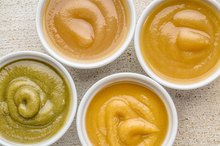What does fact checked mean?
At Healthfully, we strive to deliver objective content that is accurate and up-to-date. Our team periodically reviews articles in order to ensure content quality. The sources cited below consist of evidence from peer-reviewed journals, prominent medical organizations, academic associations, and government data.
The information contained on this site is for informational purposes only, and should not be used as a substitute for the advice of a professional health care provider. Please check with the appropriate physician regarding health questions and concerns. Although we strive to deliver accurate and up-to-date information, no guarantee to that effect is made.
Frozen Peas & Corn Nutrition Information
Freezing vegetables is a popular way to preserve them while retaining much of their original nutrition. Peas and corn lend themselves especially well to freezing because their high starch content allows for little textural change when thawed and cooked. Frozen peas and corn, prepared without added ingredients, offer many nutrients for very few calories--only 130 in a 1-cup serving.
Tips
Frozen Peas & Corn has 82 Calories and 4.71 g of Protein per 100 gram serving according to the nutrition facts provided by the USDA Food Composition Database.
Protein
Protein is a critical nutrient your body uses for muscle growth and repair, immune function and synthesis of enzymes and hormones. Your body breaks down the protein you eat into smaller molecules called amino acids, which it uses to manufacture new proteins. Most plant proteins do not contain all the amino acids your body needs, but by combining plant proteins that complement each other, you provide your body with all the essential amino acids. Legumes like peas combine with whole grains like corn to supply you with a nutritionally complete protein. According to the U.S. Department of Agriculture Nutrient Data Laboratory, a 1-cup mixture of frozen peas and corn provides 6 grams of protein to your diet 1.
- Protein is a critical nutrient your body uses for muscle growth and repair, immune function and synthesis of enzymes and hormones.
- Most plant proteins do not contain all the amino acids your body needs, but by combining plant proteins that complement each other, you provide your body with all the essential amino acids.
Carbohydrates
The Nutrition and Fiber in Crowder Peas
Learn More
Your body prefers carbohydrates, rather than fats or proteins, as a fuel source. Both peas and corn are rich sources of starch, a complex carbohydrate your body breaks down into glucose molecules. One cup of mixed frozen peas and corn contains more than 27 grams of carbohydrates. It also provides more than 6 grams of dietary fiber, which helps keep your digestive system healthy and might help ward off heart disease, obesity and certain types of cancer, according to the University of Illinois McKinley Health Center.
- Your body prefers carbohydrates, rather than fats or proteins, as a fuel source.
- Both peas and corn are rich sources of starch, a complex carbohydrate your body breaks down into glucose molecules.
Fat
While fat is an essential nutrient, too much dietary fat--especially saturated animal fat--might increase your chances of cardiovascular disease. Vegetable sources of dietary fat tend to be high in heart-healthy unsaturated fats. Frozen peas and corn supply very little fat to your diet, only about 0.75 grams per 1-cup serving and mostly in the form of mono- and polyunsaturated fats.
Vitamins
Nutrition Facts for an 8-Ounce Sweet Potato
Learn More
Frozen peas and corn provide several vitamins to your diet. Vitamin C helps your body with iron absorption and promotes wound healing. It is also an antioxidant that helps scavenge cell-damaging free radicals. Thiamin, riboflavin, niacin, pantothenic acid and folate all are B vitamins in peas and corn that function to help metabolize food and keep your cells healthy. Frozen peas also supply you with beta-carotene, the precursor to vitamin A, which is necessary for healthy eyes and skin.
- Frozen peas and corn provide several vitamins to your diet.
- Thiamin, riboflavin, niacin, pantothenic acid and folate all are B vitamins in peas and corn that function to help metabolize food and keep your cells healthy.
Minerals
Essential minerals in frozen peas and corn include:
- phosphorus
- calcium
- potassium
- magnesium
- zinc
- copper
- selenium
- manganese
Phosphorus and calcium help keep your bones and teeth healthy, while potassium and magnesium help with energy production and other cellular processes. Zinc is important in your immune function, while copper aids in hemoglobin synthesis.
Related Articles
References
- U.S. Department of Agriculture: Food Nutrient Database
- MedlinePlus: Vitamins
- Texas Heart Institute: Minerals: What They Do and Where to Get Them
- Peas, green, frozen, cooked, boiled, drained, without salt. FoodData Central. U.S. Department of Agriculture. Published April 1, 2019.
- Glycemic index and glycemic load for 100+ foods. Oregon State Extension.
- Dahl WJ, Foster LM, Tyler RT. Review of the health benefits of peas (Pisum sativum L.). Brit J Nutr 2012;108 Suppl 1:S3-10. doi:10.1017/S0007114512000852
- Appleby PN, Key TJ. The long-term health of vegetarians and vegans. Proc Nutr Soc. 2016;75(3):287-93. doi:10.1017/s0029665115004334
- Busnelli M, Manzini S, Sirtori CR, Chiesa G, Parolini C. Effects of vegetable proteins on hypercholesterolemia and gut microbiota modulation. Nutrients. 2018;10(9). doi:10.3390/nu10091249
- Centers for Disease Control and Prevention. Eat more, weigh less?. Updated May 15, 2015.
- American Academy of Allergy, Asthma & Immunology. Pea allergy and peanut allergy. Updated June 20, 2018.
- Peas. University of Illinois Extension Watch Your Garden Grow. Updated 2020.
- Snacks, peas, roasted, wasabi-flavored. FoodData Central. U.S. Department of Agriculture. Published April 1, 2019.
Writer Bio
A writer since 1985, Jan Annigan is published in "Plant Physiology," "Proceedings of the National Academy of Sciences," "Journal of Biological Chemistry" and on various websites. She holds a sports medicine and human performance certificate from the University of Washington, as well as a Bachelor of Science in animal sciences from Purdue University.









